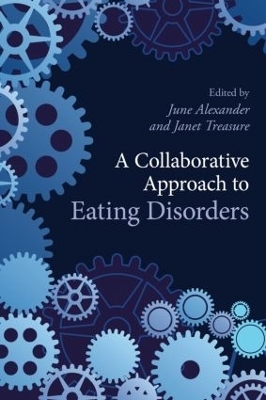
A Collaborative Approach to Eating Disorders
Routledge (Verlag)
978-0-415-58146-2 (ISBN)
A Collaborative Approach to Eating Disorders draws on up-to-date evidence based research as well as case studies and clinical vignettes to illustrate the seriousness of eating disorders and the impact on both the sufferer and their loved ones. Areas of discussion include:
current research including genetic factors, socio-cultural influences and early intervention
clinical applications such as family based dialectical and cognitive behavioural treatments
treatment developments for both adolescents and adults with a range of eating disorders
building collaborative alliances at all levels for treatment and ongoing recovery.
With contributions from key international figures in the field, this book will be a valuable resource for students and mental health professionals including family doctors, clinicians, nurses, family therapists, dieticians and social workers.
June Alexander is an Australian writer and former newspaper editor who has a 40-year career in journalism and has battled eating disorders since the age of 11. Janet Treasure is Professor, South London and Maudsley NHS Trust, and Director of the Eating Disorder Unit and Professor of Psychiatry at Guy's, King's and St Thomas' Medical School, London.
Katzman, Foreword. Part I: Understanding Risk and Resilience for Eating Disorders. Arnold, Introduction. Konstantellou, Campbell, Eisler, The Family Context: Cause, Effect or Resource. Treasure, Kanakam, The Links Between Genes and the Environment in the Shaping of Personality. Kaye, Bailer, Klabunde, Neurobiology Explanations for Puzzling Behaviours. Zucker, Moskovich, Vinson, Watson, Emotion and Empathic Understanding: Capitalizing on Relationships in Those with Eating Disorders. Paxton, Modifiable Risk Factors that Can Be Translated into Prevention or Resilience. Dove, Byrne, Obesity and Eating Disorders. Part II: Treatment. Collins Lyster-Mensh, Introduction. Birmingham, Physical Effects of Eating Disorders. Hart, Williams, Wakefield, Russell, The Role of Nutrition. David, Broft, Walsh, Pharmacotherapy of Eating Disorders. Wade, Watson, Psychotherapies in Eating Disorders. Hoste, Celio-Doyle, Le Grange, Families as an Integral Part of the Treatment Team: Treatment Culture and Standard of Care Challenges. Milstein, Arnold, Effectively Engaging the Family in Treatment. Goddard, Raenker, Treasure, Involving Carers: A Skills-based Learning Approach. Evans, Waller, The Therapeutic Relationship in Cognitive Behavioural Therapy for Adults with Eating Disorders. Federici, Wisniewski, Integrating Dialectical Behaviour Therapy and Family Based Treatment for Multidiagnostic Adolescent Patients. Bulik, Baucom, Kirby, Couples Therapy for Anorexia Nervosa. Olmsted, Carter, Pike, Relapse Prevention. Part III: Clinical Presentations. van Furth, Introduction. Doyle, Smyth, Le Grange, Childhood and Adulthood: When Do Eating Disorders Start and Do Treatments Differ? Madden, Recognising and Diagnosing Early Onset of Eating Disorders. O’Toole, Food Phobia and Functional Dysphagia. Claudino, Morgan, Unravelling Binge Eating Disorder. Gilbert, Eating Disorders in African American Women. Sundgot-Borgen, Bratland-Sanda, Eating Disorders and Athletes. Morgan, Male Eating Disorders. Part IV: Changing the Culture. Vickery, Introduction. Von Ranson, Laverty, Narrowing the Psychotherapy Research-practice Gap. Ringwood, Why Carers Need to Know about Research. Grefe, Promote Full Agenda of Rights. Tantillo, The Patient-Family-Clinician-Researcher Quest for Quality Care.
| Zusatzinfo | 4 Tables, black and white; 15 Line drawings, black and white |
|---|---|
| Verlagsort | London |
| Sprache | englisch |
| Maße | 156 x 234 mm |
| Gewicht | 640 g |
| Themenwelt | Geisteswissenschaften ► Psychologie ► Persönlichkeitsstörungen |
| Medizin / Pharmazie ► Medizinische Fachgebiete ► Psychosomatik | |
| Medizin / Pharmazie ► Medizinische Fachgebiete ► Psychiatrie / Psychotherapie | |
| ISBN-10 | 0-415-58146-X / 041558146X |
| ISBN-13 | 978-0-415-58146-2 / 9780415581462 |
| Zustand | Neuware |
| Haben Sie eine Frage zum Produkt? |
aus dem Bereich


